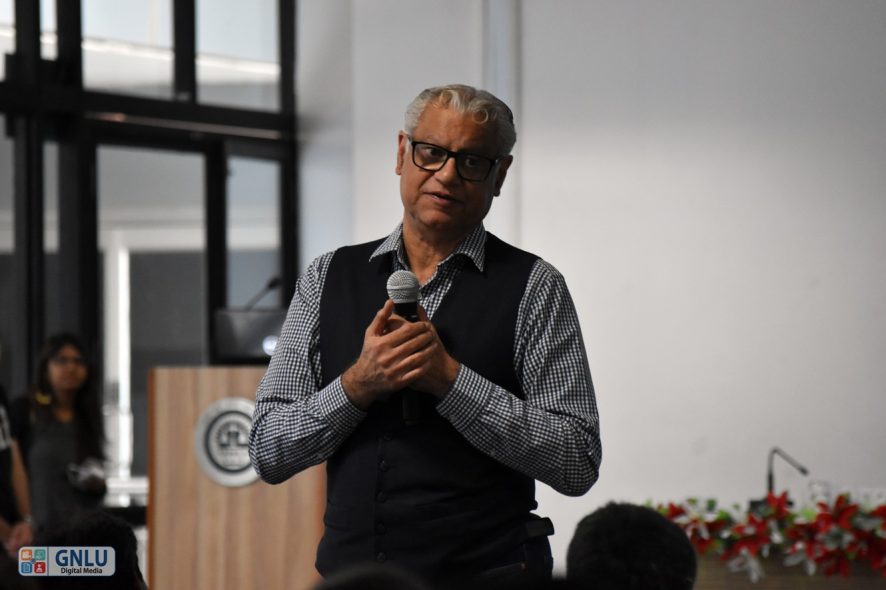The GNLU Centre for Law & Society organized an Open House session with Mr. Anand Grover, Senior Advocate, Supreme Court of India on the topic of Constitutional Morality and the Supreme Court of India on the 23rd of February, 2019. He spoke about the quality of legal education at the time he had received it, and how universities today must develop critical outlook on ideas and must be able to interrogate an idea. This became the defining outline for his interactive discussion with the audience gathered at the Open House today.
Mr. Grover, in his narrative, reflected on how India is currently at crossroads. He noted that this is a time when ‘values imbibed in the Constitution are being challenged.’ These values include ‘justice, liberty, fraternity’ and the basic right of dignity. He gave an example of how inclusiveness results in dignity, and how the presence of transsexuals or transgenders in a university would improve their treatment. He also gave examples of what constitutes ‘dignity’ and how ‘the use of terms such as prostitutes for sex workers amounts to being undignified as well as passing judgement on an occupation’. The discussion focused around laws currently applicable in India and the morality therein, with Mr. Grover noting that the same is imported as a result of colonialism, in certain instances, giving an example of Section 377.
He referred to how ‘the notion of sexuality was not binary in India. Religions such as Hinduism revered those who were intersex. As a sexual being, one has desires. Any person close to God loses this sense of desire. All religions spoke of losing this desire. There was no issue of intersex people.’ He spoke of how the ‘prejudice of British against homosexuals took over the Indian mentality as well, and made people develop hatred for homosexuals or intersex. Laws were created, and these laws led to discrimination.’ He said that the ‘core values of our constitution are found in our Preamble.’ The question of morality is not something which has to be decided, the same is in fact constitutionally inscribed. Therefore, equality lies at the heart of the Constitution and everyone must be treated equally. This Constitution is born out of a ‘history of subjugation’, the equality clause thus exists in the Constitution. Therefore, as Constitutional morality grows out of great discussion, constitutional morality is what any country must espouse.
He reflected on how he become a lawyer to help people. However, he went on to state that ‘to be a good human rights lawyer, one must be a good commercial lawyer as well, as the basic principles remain the same.’ He described the difference between civil and political rights and economic and social rights, and how different covenants exist for the same. The former is immediately enforceable, while the latter is progressively realized. These distinctions also exist within the Indian Constitution, civil and political rights are in the form of fundamental rights, and economic and social rights are economic and social rights. However, now the interpretation of fundamental rights is changing. Now, rights are not seen in strict compartments, rather are understood together. Rights, now have to be both procedurally and substantively reasonable. In examining whether laws are reasonable or violative of rights, one must examine relative merit of having it, relative demerit of not having it and if there is some alternative.
The long history of India created inequality in society. He used his personal example of when he had to deal with a case relating to HIV, and how the case taught him what stigma meant. He described how everyone has fault lines which lead to them acting in a discriminatory manner, however people must be willing to change and believe in equality. He discussed how he had an initial hesitation in dealing with an HIV-positive client and how later, this became a friendship with the same client. This client, on his deathbed, asked him to continue working in HIV awareness. Then, for five years, he constantly worked on the same issue, which culminated with the case of MX v. Y, which became a benchmark case, and allowed HIV positive patients to gain government employment.
He also spoke of his experiences of working on Section 377, and how the same was being used as a tool of extortion and discrimination against gay men. The base of constitutional morality is that everyone is to be treated equally, and if any law attacks this, the law must go. He spoke about how in Sabarimala, denying women the right to pray was undignified, and the denial of right based on a purely natural function. He advised to the students that: All have the aspiration to be good lawyers, and all have visions and passions, and one must follow those visions and passions. The most exciting part must also be the most challenging. He stated that he however knew that victory was imminent, as causes which are just, they would surely succeed.



